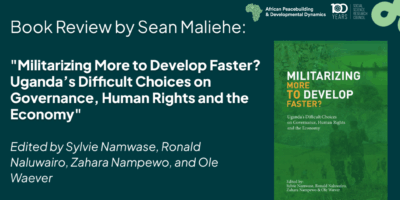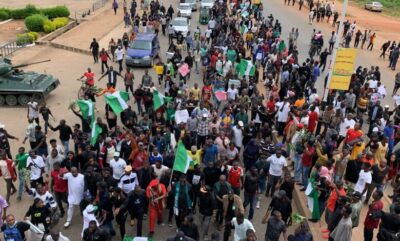After six decades of oil production the Niger Delta, from which Nigeria gets the bulk of her income, has remained underdeveloped and suffers from serious environmental degradation. To fight environmental injustices, people of the region use litigation as part of their strategy. A common feature of these cases is that they pit pollution-ravaged communities against wealthy and powerful multinational oil companies (MNOCs). These lawsuits have, however, been fraught with numerous challenges and resulted in minimal gains. In a recent trend, litigations by Niger Delta oil-producing communities are steadily moving to courts in Europe.
In a typical scenario in which the legal battlefield shifts, imagine that X is an oil-producing community in Nigeria. Several of the community’s streams and farmlands have been polluted by an oil spill from the facilities of Y, a MNOC. X subsequently sues Y and Y’s parent company in, for example, the United Kingdom. The latter jurisdiction often becomes a principal focus when Nigerian courts deny or evade justice for community X.
This contribution interrogates some factors behind the quest for environmental justice in foreign jurisdictions. I argue environmental devastation is preceded by social injustice, distributive injustice, and other forms of injustice, which act as barriers to accessing environmental justice. However, environmental struggles fought on several fronts, including courts abroad, could ultimately yield results.
Access to environmental justice and the courts
Justice for all and equality before the law are foundational ideas of the court system, which is expected to provide a level playing field to litigants. The confidence reposed in the judiciary is reflected in statements describing the judiciary as the last hope of the common man. According to T. H. Marshall, the right to justice is, “the right to defend and assert all one’s rights on terms of equality with others and by due process of law. This shows us that the institutions most directly associated with civil rights are the courts of justice.”1T. H. Marshall, “Citizenship and Social Class,” in Inequality and Society: Social Science Perspectives on Social Stratification, eds. Jeff Manza and Michael Sauder (New York: W.W. Norton and Co., 2009), 148. The courts play a role in ensuring that victims of environmental injustice are able to access justice. In the words of Jonas Ebesson, “access to environmental justice provides a means to enforce environmental laws, correct erroneous administrative acts, decisions and omissions and to push competent authorities to do their job.”2Jonas Ebesson, “Access to Justice at the National Level,” in The Aarhus Convention at Ten: Interactions and Tensions between Conventional International Law and EU Environmental Law, ed. Marc Pallermaerts (Europa Law Publishing, 2011), 247.
The experiences of indigenous peoples in Nigeria, South Africa, and South and Central America have shown how social and economic injustices often precede environmental degradation and in turn create a climate where access to environmental justice is problematic.
Ogoniland: A microcosm of dispossession, underdevelopment, and environmental devastation
The Ogoni are one out of hundreds of communities in the Niger Delta who suffer dispossession by the MNOCs, the Nigerian state, and its ruling elite, as well as environmental devastation from the reckless profit-driven activities of MNOCs. What makes the case of the Ogoni unique is the publicity their plight has received.
The dispossession of the Niger Delta peoples dates back to colonial times when the British colonial government gave an oil exploration monopoly in Nigeria to British or British-allied firms.3Cyril I. Obi, “Oil Extraction, Dispossession, Resistance, and Conflict in Nigeria’s Oil-Rich Niger Delta,” Canadian Journal of Development Studies 30, nos. 1–2 (2010): 222. In the late 1960s and 1970s, Nigeria’s military rulers decreed that the ownership of oil and gas be vested in the Nigerian state, effectively dispossessing the local peoples of control over their land and natural resources of oil and gas.
“The military rulers and their civilian cronies also shared lucrative oil blocs among themselves, to the exclusion of the oil producing communities.”The state-owned Nigerian National Petroleum Corporation (NNPC) then entered into Joint Venture Agreements with the MNOCs. The military rulers and their civilian cronies also shared lucrative oil blocs among themselves, to the exclusion of the oil producing communities, which remained grossly underdeveloped. In about fifty years Nigeria has earned over eight hundred billion dollars from oil and gas extracted from the Niger Delta, while many parts of the region lack good roads, pipe-borne water, and adequate educational and health facilities.4United Nations Development Programme Nigeria (UNDP). Niger Delta Human Development Report (Abuja, Nigeria: UNDP, 2006). In statements credited to Funsho Kupolokun, a former Group Managing Director of NNPC, Nigeria earned over eight hundred billion dollars from oil and gas in fifty years.
The Niger Delta illustrates David Harvey’s accumulation by dispossession, i.e., “to transfer assets and redistribute wealth and income either from the mass of the population towards the upper classes or from vulnerable to richer countries.”5David Harvey, “Neoliberalism as Creative Destruction,” Annals of the American Academy of Political and Social Science 610, no. 21 (2007): 34. For an application of this idea in Nigeria, see Obi, “Oil Extraction, Dispossession, Resistance, and Conflict in Nigeria’s Oil-Rich Niger Delta,” 221. The dispossession of lands and minerals of indigenous groups and widespread pollution by profit-seeking capitalists exemplifies environmental injustice.
The MNOCs, solidly backed by a succession of dictatorships, carried out their oil exploration and production activities with recklessness and impunity, profit being the overriding motive, and resulting in large-scale environmental degradation in the region. Efforts by communities to protest peacefully were met with brutality by the military regime, culminating in the execution of Ken Saro Wiwa, a leading environmental activist, and eight other Ogoni activists on November 10, 1995.
As a result of reckless exploitation, the Niger Delta has been listed as one of the ten most polluted environments in the world.6Blacksmith Institute and Green Cross, The Top Ten Toxic Threats: Cleanup, Progress, and Ongoing Challenges (Blacksmith Institute, New York, and Green Cross, Switzerland, 2013), 18. Uninterrupted flaring of associated gas goes on in many oil-producing communities despite a Federal High Court decision that found the practice of gas flaring violated the constitutional right to life.7Jonah Gbemre v. Shell Petroleum Development Company and two others, (2005) AHRLR 151 (NgHC 2005).The first environmental assessment of the Ogoni environment was conducted by the United Nations Environment Programme (UNEP) in 2011 and found that all the water bodies in Ogoni were polluted by oil.8United Nations Environment Programme, Environmental Assessment of Ogoniland (Nairobi, Kenya: UNEP, 2011). What people took as potable water had carcinogens, such as benzene, up to nine hundred times above WHO standards. In some places in Ogoniland, the soil is polluted with hydrocarbons to a depth of five (5) meters, and in many cases the contamination had penetrated to the groundwater. Clean-up and rehabilitation of Ogoniland could take twenty-five to thirty years and will involve a minimum of one billion US dollars to cover the first five years. Since the publication of the report, its recommendations are yet to be carried out by the Nigerian government or Shell.
Access to environmental justice in Nigerian courts: Some challenges
Compounding the abovementioned injustices is the general ignorance by the public of the legal framework, delays in the judicial system, the high cost of litigation, and restrictive rules of locus standi, which constitute the greatest obstacles to using legal processes to protect the environment in Nigeria. A 2015 survey of enforcement officials and legal practitioners corroborates this argument.9Ebunoluwa O. Popoola, “Appraisal of the Contemporary Jurisprudence on the Right to Environment: A Case Study of Nigeria and South Africa” (PhD diss., Ahmadu Bello University, 2016), 390-2.
Poverty, High Cost of Litigation, and Ignorance: The manifestations of social and economic injustice are reflected in the inability of many victims of environmental degradation to access the courts because of their socio-economic disadvantages. Two major socio-economic factors hindering access to justice for environmental law violations in Nigeria are poverty and ignorance.10Emeka P. Amechi, “Poverty, Socio-Political Factors and Degradation of the Environment in Sub-Saharan Africa: The Need for a Holistic Approach to the Protection of the Environment and Realisation of the Right to Environment,” Law, Environment and Development Journal 5, no. 2 (2009): 107. Poverty may simultaneously be a consequence of environmental devastation and an obstacle to accessing environmental justice.
“In Nigeria, justice is priced beyond the reach of the poor.”In Nigeria, justice is priced beyond the reach of the poor. The high cost of litigation has an adverse effect on access to courts and legal representation by negatively affecting the ability of victims to retain lawyers, hire experts, and use legal institutions. The lack of legal aid for environmental litigants facing wealthy corporations means a level playing field is nonexistent. Further impeding access to justice is victims’ ignorance of existing environmental laws and the relevant institutions available for legal redress. Most Nigerians are unaware of existing environmental laws, including how a degraded environment affects their human rights.11Popoola, “Appraisal of the Contemporary Jurisprudence on the Right to Environment,” 390.
Locus Standi: The rigid application of the doctrine of locus standi (standing to sue) has barred many environmental litigants from accessing environmental justice. The issue of locus standi relates to Nigerian environmental laws conferring only government agencies with standing to sue. In this way a government that fails to enact strong laws or enforce its own laws is protected by a system that bars interested members of the public from suing.
For example, in Centre for Oil Pollution Watch v. NNPC,12(2013) 15 NWLR (Pt.1378) at 556. the appellant, an NGO involved in environmental activities, sued the respondent at the Federal High Court in Lagos for restoration and remediation of the environment in Acha community in Abia state, particularly some streams contaminated by an oil spill. The appellant also asked for provision of potable water as a substitute to the contaminated streams, which were the community’s only sources of water. The trial court dismissed the suit on the grounds that the respondent had no standing to sue. On appeal, the Court of Appeal upheld the decision of the High Court. In spite of foreign decisions cited by the appellants (in support of public interest litigation), the court held that the Nigerian approach has not evolved to that stage.
Public interest litigation (PIL) is an effective medium for promoting access to environmental justice as most environmental matters concern the public. Moreover, it is in the interest of every citizen to see that the law is complied with. The use of PIL in the United Kingdom, South America, India, and Pakistan has contributed to the growth and development of environmental law in those jurisdictions.13David R. Boyd, “The Environmental Rights Revolution: Constitutions, Human Rights, and the Environment” (PhD diss., University of British Columbia, Vancouver, 2010), 266-270. In Nigeria, however, decisions like Centre for Oil Pollution Watch v. NNPC14(2013) 15 NWLR (Pt.1378) at 556. are likely to have a chilling effect on NGOs instituting public interest litigation for the protection of the environment.
Delay in Justice Delivery: A major hindrance to environmental justice is the delay in justice delivery in Nigeria. It is common for environmental litigation in Nigeria to drag on for over a decade, making it more expensive and frustrating. Such delays discourage officers of environmental agencies and victims of environmental rights violations from seeking legal redress owing to the inordinately lengthy time cases take.15Popoola, “Appraisal of the Contemporary Jurisprudence on the Right to Environment,” 390-2. One of the strategies corporate polluters use to avoid liability is delaying court hearings so as to frustrate litigants.
“The action was instituted in 1983 at the High Court and final judgment by the Supreme Court was delivered in 2015, 32 years later.”Shell v. Anaro,16(2015) LPELR-24750(SC); (2001) FWLR (Pt.50) 1815 (CA). which involved four Ijaw17The Ijaw are an indigenous ethnic group in the Niger Delta who have borne much of the brunt of pollution from the oil industry and who remain grossly underdeveloped.communities, is a vivid example of the intolerable delay in justice delivery and of how MNOCs use the appeal system to further frustrate pollution blighted communities. The action was instituted in 1983 at the High Court and final judgment by the Supreme Court was delivered in 2015, thirty-two years later.18The first judgment was delivered on May 27, 1997, after fourteen years of legal proceedings. Shell, the defendant, appealed to the Court of Appeal, which dismissed the appeal on May 22, 2000. Shell further appealed to the Supreme Court, which in its June 5, 2015, judgment upheld the decision of the trial court. The High Court awarded the affected communities approximately thirty million naira (approx. 1.37 million dollars) in damages for oil spillage.
Other battlefields: The journey so far
Confronted with the difficulties in obtaining environmental justice, communities in the Niger Delta and environmental NGOs have taken the battle to courts outside Nigeria. In cases filed at the African Commission on Human and Peoples’ Rights and the Economic Community of West African States (ECOWAS) Court of Justice, judgments have been passed that uphold the rights of affected communities to a healthy environment.19→Socio-Economic Rights and Accountability Project (SERAP) v. Nigeria, ECW/CCJ/APP/08/09.
→The Socio-Economic Rights Action Centre (SERAC) and Another v. Nigeria, (2001) AHRLR 60 (ACHPR 2001), Communication 155/96. However, just as moving the battlefield has its positive sides,20Where, for example, a state has ratified a human rights treaty but failed to domesticate it, its national courts may lack jurisdiction to entertain cases based on the treaty. However, a regional court, such as the ECOWAS court, will have jurisdiction to hear and entertain such a case, since it is empowered to apply international instruments relating to human rights and ratified by the state(s) party to the case. there may also be challenges associated with instituting cases in these regional courts.
Some regional courts stipulate that a prospective litigant wishing to invoke the jurisdiction of the court (wishing to have his case heard by the court) must show he has exhausted local remedies.21Article 56 African Charter on Human and Peoples’ Rights. Also, it is not in all cases that regional courts will have jurisdiction. For example, regional courts may lack jurisdiction over MNOCs where the MNOCs are nonparties to the treaties of the courts.22In SERAP v. Nigeria (supra), the Court declined jurisdiction over the oil companies on the grounds that the six oil companies were not parties to the ECOWAS Treaty, and the case proceeded against the Nigerian government. The institution of lawsuits in foreign jurisdictions also raises legal issues on enforcement of foreign judgments.
Victims of pollution damage and local activists wishing to sue in a foreign jurisdiction have to overcome the high costs of litigation and jurisdictional challenges. This can be done by networking and partnering with established environmental and human rights groups willing to provide funding and necessary legal services.
“The Dutch Court upheld its jurisdiction not only over the Dutch parent company, but also over the claims arising from the conduct of Shell in Nigeria.”The case of Saro Wiwa v. Royal Dutch Petroleum Co.,23Wiwa v. Royal Dutch Petroleum Co., 2002 WL 319887 (S.D.N.Y. 2002). which charged Shell with complicity in human rights abuses against the Ogoni people, set a precedent of Nigerian plaintiffs successfully suing a MNOC in a foreign jurisdiction. In a judgment in the case of Akpan and Vereniging Milieudefensie v. Royal Dutch Shell PLC and Shell Petroleum Development Company of Nigeria Ltd (SPDC),24Friday Alfred Akpan and Vereniging Milieudefensie vs. Royal Dutch Shell PLC and Shell Petroleum Development Company of Nigeria Ltd, District Court of The Hague [2013] ECLI.NL.RBDHA.2013.BY9854 Rechtbank Den Haag, 30-01-2013, C/09/337050/HA ZA 09/1580. the District Court of The Hague found SPDC, the Nigerian subsidiary of Royal Dutch Shell Plc., liable for the environmental damage caused by a series of oil spills that occurred between 2006 and 2007. The Dutch Court upheld its jurisdiction not only over the Dutch parent company, but also over the claims arising from the conduct of Shell in Nigeria.25Ibid.
In January 2015, Shell agreed to a fifty-five million pounds out-of-court-settlement with members of the Bodo community in Ogoniland in respect to two operational oil spills in 2008 and 2009. The out-of-court settlement followed a lawsuit filed against Shell in a London High Court in which residents of the Bodo community had demanded restitution for loss of livelihood caused by two oil spills. The settlement was reached after the Court made a ruling considered favorable to the plaintiffs.
The assertion of jurisdiction by British and Dutch courts over damages that occurred in Nigeria, but involving subsidiaries of British and Dutch multinationals, shows that multinationals can and should be held accountable in their home jurisdictions for damage caused by, or related to, the operations of their foreign subsidiaries.
The successes recorded in these cases show that moving the battlefields may yield positive results. The support of environmental activist groups who prepared the groundwork in the foregoing cases proved invaluable, as did the release of science-based reports, such as the UNEP Report on Ogoniland. With the shift to renewable sources of energy, several MNOCs are divesting from their operations in developing countries. These companies should be made to assume full liability for the environmental problems they created.
Justice sector reforms in developing countries are imperative. It is doubtful whether Western courts will be able to entertain all the environmental lawsuits arising from the activities of MNOCs. Any such reforms must ensure that the imperative of restoring the environment is adequately recognized by the courts. Reforms must also work toward just societies where people have a say in what happens in their environments and global capital is restrained from trampling on the rights of vulnerable groups.
Banner photo credit: Friends of the Earth, Netherlands/Flickr
References:
→The Socio-Economic Rights Action Centre (SERAC) and Another v. Nigeria, (2001) AHRLR 60 (ACHPR 2001), Communication 155/96.















Comments are closed.